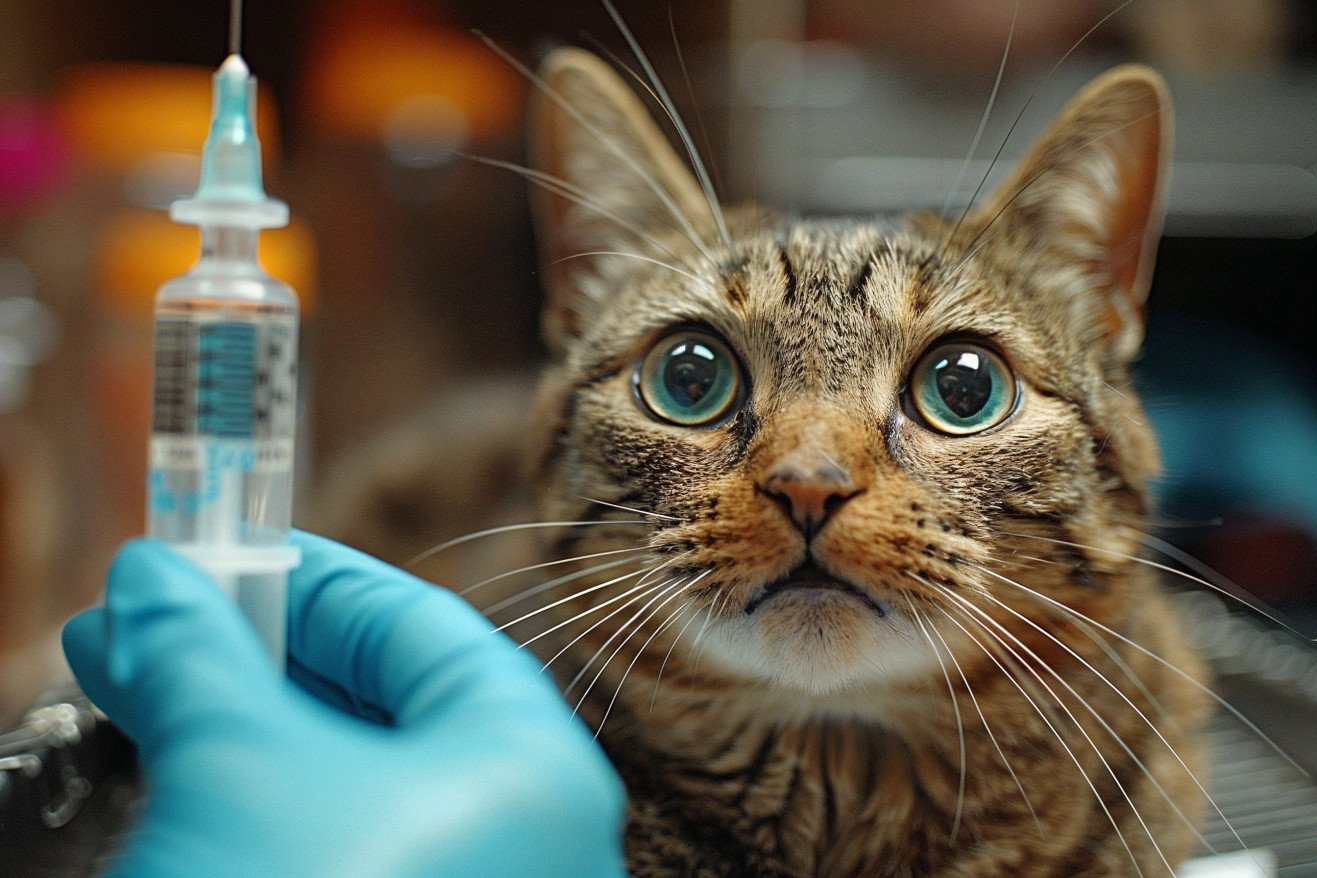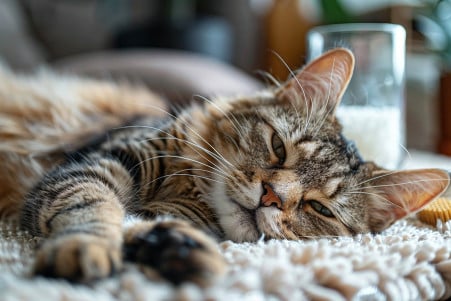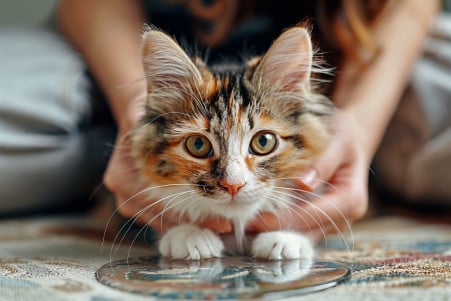How to Make a Cat Throw Up Safely: Vet-Approved Methods
23 May 2024 • Updated 23 May 2024

If your cat has eaten something toxic or is experiencing tummy troubles, you may be wondering how to make a cat throw up safely. However, it's important to note that you should only attempt to make a cat vomit under the guidance of a veterinarian, and you should never try to make a cat throw up using objects or substances that can cause harm.
To provide a comprehensive overview of this important but delicate subject, we've referenced veterinary experts and reputable animal welfare organizations to find out when it's appropriate to make a cat vomit and the safest ways to do so. As a result, you can trust that the information in this article is based on the latest scientific research and will prioritize your cat's safety and well-being when it comes to accidental poisonings and other causes of stomach upset.
How can I safely make a cat throw up?
Vet-Approved Emetic Medications for Cats
According to veterinary professionals, the safest ways to induce vomiting in cats are with injectable medications such as dexmedetomidine, hydromorphone, and xylazine, all of which are only available through a licensed veterinarian. These medications have a 60-75% success rate and can be reversed if necessary to prevent any adverse reactions.
On the other hand, hydrogen peroxide and apomorphine are not recommended for cats because of the risk of severe stomach ulceration and other side effects. It's important to note that the safe use of these emetic medications is contingent on the cat receiving the proper dosage and being monitored by a vet.
There are also times when it's not recommended to induce vomiting even with vet-approved methods. For example, if the cat ingested the toxin more than 2-3 hours before treatment, vomiting is unlikely to be effective because the substance may have already been absorbed or passed through the stomach. In addition, vomiting should not be induced if the cat ingested caustic materials such as bleach or petroleum products because of the risk of chemical burns and aspiration. Finally, vomiting should not be induced in cats with brachycephalic syndrome because of the increased risk of aspiration. In all of these cases, it's important to get the cat to a vet as soon as possible for proper decontamination and treatment.
Signs of More Serious Vomiting in Cats
If your cat is vomiting frequently or the vomiting lasts for more than 24 hours, it could be a sign of a more serious condition that requires veterinary care, according to Purina. Other symptoms that may indicate a more serious problem and require veterinary care include weakness, loss of appetite, diarrhea, pale gums, and vomiting blood or bile, according to the Cornell University College of Veterinary Medicine.
Cats may also show signs of nausea before vomiting, such as lip licking, excessive swallowing, drooling, or eating grass, according to PDSA. Thick, yellow vomit or dry heaving may indicate an obstruction or other serious problem, according to VMBS News. In addition, if your cat has a sudden change in behavior or hasn't eaten in 24 hours, you should contact your vet.
Home Remedies for Mild, Occasional Cat Vomiting
If your cat is experiencing occasional or mild vomiting, fasting for 12-24 hours and water can help calm the stomach. After the fasting period, you can slowly reintroduce a bland diet of boiled chicken or turkey and white rice to help with digestion.
Probiotics, plain Greek yogurt, and hairball remedies can also help with mild digestive problems in cats. Ginger tea and petroleum jelly can help soothe the stomach and make it easier for your cat to pass hairballs.
If your cat’s vomiting doesn’t improve or gets worse after trying home remedies, or if your cat shows other symptoms that are concerning, make sure to take them to the vet as soon as possible. Home remedies are meant for occasional, non-severe cases and should not be used in place of professional medical care.
Causes and Treatment of Cat Vomiting
There are many reasons why a cat might vomit, including dietary indiscretion, hairballs, ingestion of a toxin, gastrointestinal issues, organ failure, infections, and cancer, according to VCA Animal Hospitals. To determine the cause, a vet will take a history, look at the vomit, conduct a physical exam, and may also do bloodwork and imaging.
Treatment will depend on the cause and may include dietary modification, antiemetic drugs, gastroprotectants, fluids, and in some cases, surgery or chemotherapy, according to Best Friends Animal Society. It's important to seek treatment as soon as possible since vomiting can lead to dehydration and electrolyte imbalances if it's not addressed, says the Merck Veterinary Manual.
It's also important to make sure to follow the vet's instructions and keep a close eye on your cat as they recover, according to PetMD.
How to Avoid and Deal With Chronic Vomiting in Cats
If your cat is dealing with chronic or recurrent vomiting, it's important to figure out the root cause so that you can manage the issue in the long term, according to Carolina Veterinary Specialists. Your vet may also suggest dietary changes, such as a prescription diet or an elimination diet to see if your cat has a food allergy, according to The Cat Doctor Atlanta.
To help with stress-induced vomiting, you can also try stress management strategies like environmental enrichment and pheromone diffusers, says VCA Animal Hospitals. Your vet may also prescribe medications like anti-nausea drugs, antacids, or appetite stimulants to help manage symptoms and keep your cat healthy, according to Best Friends Animal Society.
It's also important to make sure that you're taking your cat to the vet for regular check-ups and monitoring if they're dealing with chronic vomiting so that you can make changes to their care plan as necessary and avoid any complications, according to Hillcrest Animal Hospital. And make sure to take your cat to the vet as soon as possible if you notice any changes in their condition so that you can make sure that they're as healthy as possible in the long term.
Conclusion: Making Your Cat's Health and Safety a Priority
This article has highlighted the importance of seeking veterinary care when dealing with vomiting in cats. It's also important to note that vomiting should only be induced under the supervision of a professional and with approved methods, as forceful vomiting can lead to injury. Finally, it's important to recognize the signs of serious vomiting, including persistent vomiting and other symptoms, so that you can get your cat the medical attention they need and prevent complications.
Finally, it's important to make sure you follow any treatment plans and continue to monitor your cat's health after they've been treated for vomiting, whether it's a one-time occurrence or a chronic issue. Above all, the most important thing to do when you're dealing with vomiting or any other digestive issue is to make sure you're prioritizing your cat's health and well-being. The best way to do this is to make sure you're working with a vet to ensure your cat gets the care and support they need.


